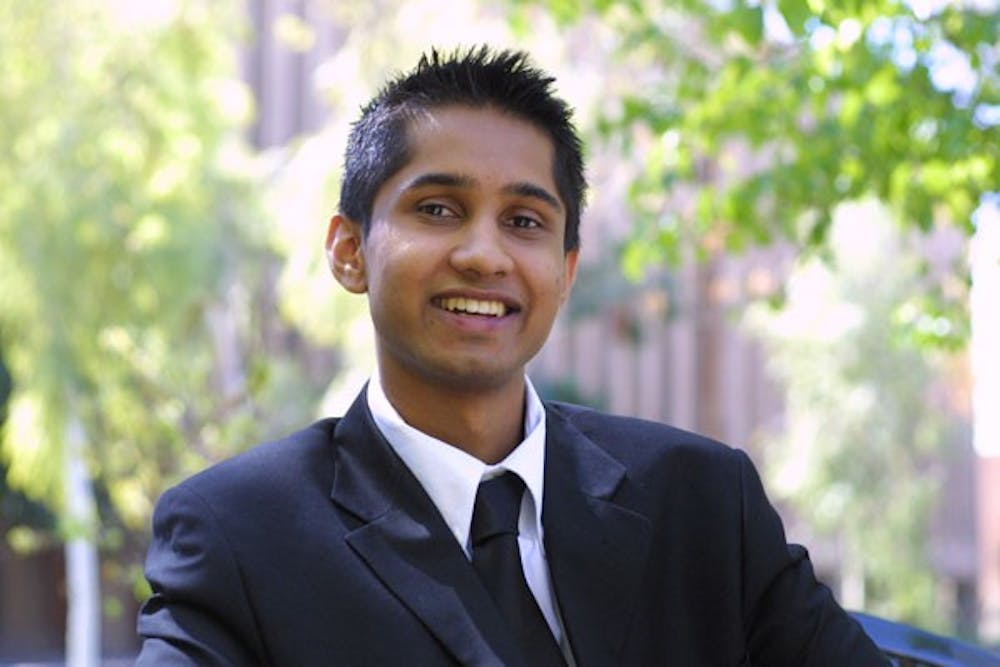A possible solution to battling tuition increases brought forth by one student government candidate has caused debate over a ballot measure passed by Arizonans more than a decade ago.
Sharvil Kapadia, a presidential candidate for Undergraduate Student Government, is running on a platform to amend Proposition 105, a citizen-drafted measure approved by voters in 1998.
Proposition 105, or the Voter Protection Act, prohibits the governor from vetoing any citizen-approved initiative or referendum, and allows the Legislature to amend such laws only by a three-fourths majority in each house, and only if such an amendment adds to the measure’s original intent.
The act also prohibits lawmakers from touching funds for certain state programs approved in an initiative or referendum.
This is where Kapadia said an amendment to the law needs to be made.
Of the $10 billion in the state’s 2008 General Fund budget, $3.6 billion could be seen as voter-protected, according to a 2008 report by the Joint Legislative Budget Committee. In addition, $1.2 billion in non-General Fund spending was also protected by Proposition 105.
State agencies that receive some voter-protected funding include the Arizona Department of Education, the Department of Health Services and the Arizona State Parks Board.
Kapadia wants to get students involved in working to change the law. Ideally, he said, this would give legislators more freedom when it comes to cutting expenses and balancing the state’s budget — an idea that has already been proposed by several state lawmakers.
“They put all this money into this pot,” Kapadia said. “And nobody has the password to this pot or locker.”
For Kapadia, granting lawmakers access to these untouchable funds means diverting money to higher education or making less cuts to higher education.
“[State legislators] just have to make good fiscal decisions,” he said.
The only voter-protected funds related to the state’s three universities are used partly to pay for scientific research. The Technology and Research Initiative Fund, or TRIF, helps pay for research expenses at ASU’s Biodesign Institute. Pre-estimates of the amount of taxpayer money put toward TRIF for fiscal year 2009 were $66.5 million.
However, the other three USG presidential candidates don’t see eye-to-eye with Kapadia.
Candidate Brendan Corrigan said he supports Proposition 105 and sees the law as a form of “direct democracy” that gives citizens control over the government and how tax money is spent.
Corrigan proposes that citizens take advantage of Proposition 105 in the form of a tax measure that would make more higher education funds voter protected.
Proposition 100, a three-year, 1-cent sales tax increase to be featured on the May 18 special election ballot, is one such measure.
If the measure fails, the state has projected that about $107 million will be cut from the university system.
“I believe taxpayers are in favor of funding an affordable education because they realize education is the key to success, and in the long run, will benefit the state,” Corrigan said in an e-mail.
Kapadia, who supports Proposition 100, said he doesn’t think the measure will pass and sees amending Proposition 105 as a backup plan.
“We’re the only ticket that has a solution for [the failure of Proposition 100],” Kapadia said.
Candidate Jacob Goulding agreed with Corrigan that Proposition 105 ensures a direct democratic voice of the Arizona people.
Goulding said that if the 1998 measure is amended, lawmakers would not use the opportunity to fund higher education.
“They will seize the opportunity and cut higher education in a myopic and misguided attempt to balance the budget deficit,” he said in an e-mail.
Rep. John Kavanagh, R-Fountain Hills, said education makes up about half of the state’s budget, and cuts to education are hard to avoid when some of those funds can’t be touched.
“I don’t support any voter-protected funds,” Kavanagh said.
Two measures that will free funding from voter protection will be featured on the November ballot. One referendum will end the First Things First childhood program, and another will transfer money from a land preservation fund.
Both will result in about $450 million being put back into the non-voter-protected general fund, Kavanagh said. Students who want to reduce future education cuts should support these two measures, he said.
Candidate Athena Salman said freeing up voter-protected funds doesn’t guarantee protection to the university system.
“There’s no indication that just because we make these funds available that they’re going to put them toward higher education,” Salman said.
Kapadia said amending the 1998 measure would not automatically mean a decrease in student tuition.
If students lend their support to the Legislature by helping pass an amendment, he said, lawmakers would be more willing to work with students in protecting higher education.
Reach the reporter at kjdaly@asu.edu





